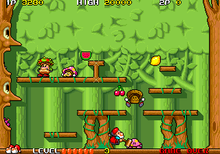- Don Doko Don
-
Don Doko Don Developer(s) Taito Publisher(s) Taito Platform(s) Arcade, NES, TurboGrafx-16 Release date(s) 1989 Genre(s) Action, Platform, Comical action game Mode(s) One- or two-player Cabinet Upright Display Horizontal, Raster, standard resolution Don Doko Don is a 1–2 player platform arcade game by Taito made in 1989.
The players are bearded dwarves who must defeat various enemies by using a mallet to stun them. Players can pick stunned enemies up and throw them at other enemies to destroy them. Destroyed enemies leave behind fruit which can be collected for points. Once all enemies are destroyed play proceeds to the next level which is generally more difficult.
Throughout the game, various power-ups can be collected, which represent potions, hammers, or books help the players' character speed up, receive more power, or kill in different ways. In certain screens various secret levels can be accessed.
The game was ported over to the Nintendo Entertainment System and TurboGrafx-16. A sequel called Don Doko Don 2 was made for the Nintendo Entertainment System which, unlike the first, is more of a standard side-scrolling platformer. Pirated versions of this sequel have been labeled with names like "Mario 8" and "Super Bros. 8".
This game is also featured on the PlayStation 2 and Xbox consoles on the classics collection entitled Taito Legends 2.
External links
Categories:- 1989 video games
- Arcade games
- Nintendo Entertainment System games
- Taito games
- TurboGrafx-16 games
- Taito stubs
- Arcade game stubs
Wikimedia Foundation. 2010.

